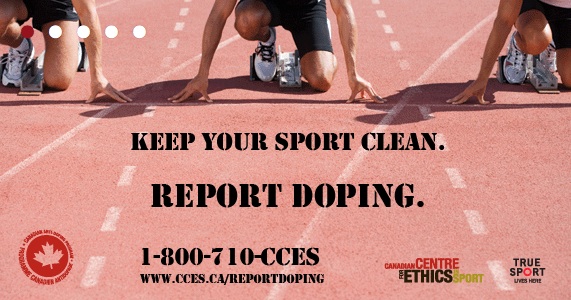
“With increased intelligence we can test the right athlete, at the right place and at the right time. This is a huge win for fair and clean sport.” — Paul Melia, Canadian Centre for Ethics in Sport CEO and President, in a press release
On Nov. 5, the Canadian Centre for Ethics in Sport announced the creation of a new and anonymous Report Doping Hotline (1-800-710-CCES), funded by the Canadian government, Canadian Olympic Committee and the Canadian Paralympic Committee to the tune of nearly $1 million Canadian dollars.
According to the CCES website, the hotline came about as a result of public-opinion research commissioned by the CCES. According to its findings, “Canadian and athletes want clean sport.” The additional funding will ensure that all Olympic and Paralympic athletes will be tested during the months leading to the Sochi Olympics and provide a risk-free platform for reporting their peers.
Canada is not the first country to come up with a snitch line for doping accusations. The United Kingdom and Australia have similar hotlines, as well as the United States. Another endurance sport, cycling is also attempting to round up dopers through its Union Cycliste Internationale (UCI) Hotline. The UCI hotline, in place since January 16 records calls then forwards them to trained specialists in the anti-doping field who then decide what actions need to be taken to catch the suspected cheaters.
Established in 2004, US Anti-Doping Agency (USADA) Play Clean Tip Center (1-877-752-9253) invites callers to leave a message so that the USADA can contact the caller. It is also possible to email or physically mail a note.
“The line was designed as an avenue, for anyone, but especially for athletes, to contact USADA when they believe doping has compromised the integrity of sport,” USADA Media Relations Manager Annie Skinner wrote in an email. “Callers may choose to remain anonymous and all information is evaluated.”
According to Skinner, USADA also accepts tips about suspected cheaters outside of the U.S.
“It’s another step toward catching dopers. Testing does catch some people, but going ‘inside’ the sport and allowing an avenue for clean athletes to report suspicious activity is important.” — Justin Wadsworth, head coach of Cross Country Canada’s World Cup Team
Canada’s doping hotline seems to be getting some use, with an “all lines are busy” message frequently encountered by callers, as this FasterSkier reporter learned through a battery of calls over the course of several days.
An Olympic gold medalist from the 2002 Winter Games, Canadian Beckie Scott stands behind the new hotline. Initially third in the 5-kilometre pursuit, she became the first North American woman to earn an Olympic gold more than two years after the Games; the first- and second-place finishers were disqualified for testing positive for banned substances.
In an interview with CBC Radio’s “As it Happens,” Scott said she would have used the hotline had it existed when she was racing. She would have called about suspicious activity she witnessed, which didn’t include her Canadian teammates, who were 100-percent clean, she said.
Her husband and current head coach of the Canadian national cross-country ski team, Justin Wadsworth also supports the hotline.
“It’s another step toward catching dopers,” he wrote in an email. “Testing does catch some people, but going ‘inside’ the sport and allowing an avenue for clean athletes to report suspicious activity is important. I think the future of catching athletes and teams who dope is through more investigative work coupled with targeted out-of-comp testing. Either way, allowing an anonymous way to give testing agencies more info is a good thing.”
While Wadsworth hints at that doping is larger than isolated individual incidents, the CCES website comes right out and states: “Athletes who dope, rarely, if ever, act alone.”
Citing the Lance Armstrong doping scandal, CCES President and CEO Paul Melia wrote on his blog that doping riders were aided and abetted by coaches, trainers, doctors, and others. Catching and punishing those in the supply chain will put a dent in doping, he reasoned. Working with Border Services Agencies is a start. Much can be learned from intelligence gathering on the importation of banned substances and drug enforcement agencies can provide information on drug busts and seizures. Name gathering at the drug trafficking level can lead to names and destinations at the receiving end of the deal.
“Perhaps there is a more immediate and valuable source of information, that up until now has gone largely untapped,” Melia added. “That source is the athletes themselves.”
While the new World Anti-Doping Agency (WADA) Code gives caught dopers reduced sanctions if they provide information on others involved in banned behavior, the new code does not encourage clean athletes to share suspected doping activity.
“It is up to individual countries, their sports governing bodies and their national anti-doping agencies to come up with ways to do this,” Melia explained.
The plan is big in Canada and with nearly $1 million dollars behind it, it is clear that the nation intends to catch dopers before they get to Sochi in February. The first step might be to man the phone lines with actual people, rather than automated requests to leave messages.
Nancy Fiddler
Nancy Fiddler is a two-time Olympian and 14-time National Champion. She has been coaching juniors and masters for 20 years in Mammoth Lakes and Truckee, Calif., and most recently in Sun Valley, Idaho. She lives most of the time in the Eastern Sierra with her husband and daughter and is currently trying to get in touch with her creative side through writing.



